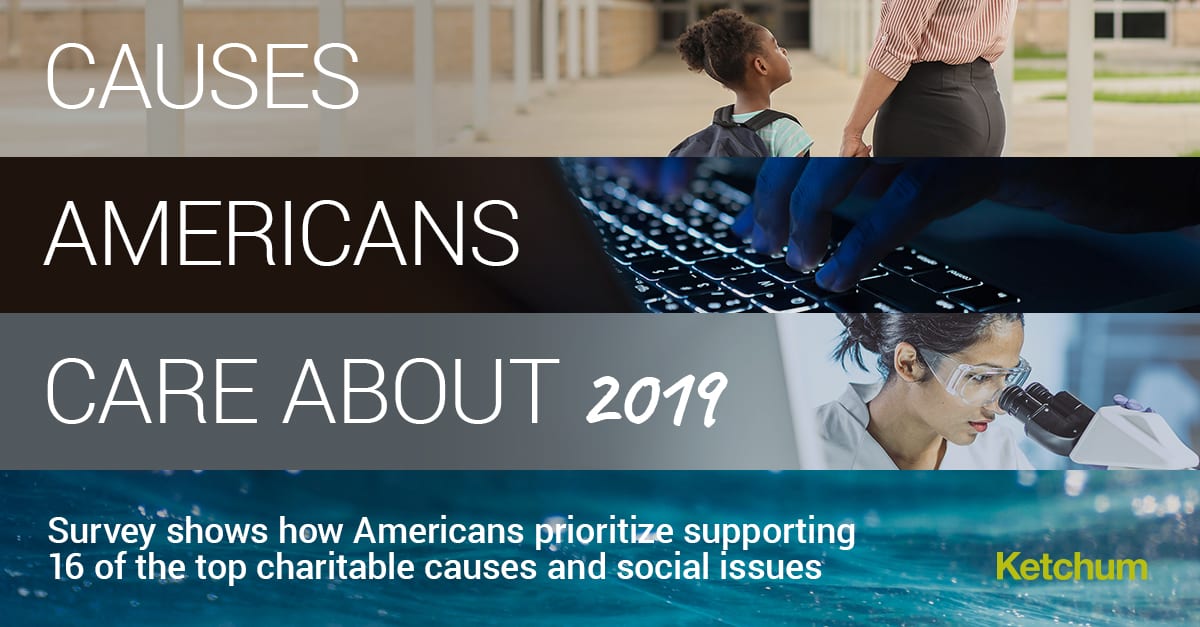In what some observers might call a “man bites dog” moment, the Business Roundtable (BRT) – a group of nearly 200 CEOs of major U.S. companies – recently proclaimed that a corporation’s purpose should balance the needs of shareholders with stakeholders.
That’s really big news, because for decades, the BRT made it clear that Purpose #1 of any corporation was to maximize value for shareholders. And while that, of course, is still an essential component of good business, it shouldn’t be the only priority on a C-suite’s to-do list.
The timing of this news is interesting, as it coincides with the results of Ketchum’s annual Causes Americans Care About survey. Now in its fourth year, the survey is a joint effort by Ketchum’s Purpose and Analytics teams to gauge how Americans prioritize supporting 16 of the top charitable causes and social issues dominating consumer conversation.
We’ll get to the specific results in a moment. But it’s important to pause and reflect on this significant inflection point, as the definition of “purpose” has evolved throughout society, even into the upper reaches of corporate hierarchies. We’re seeing an irrefutable increase in its importance to many types of organizations – with respect to consumer loyalty, employee satisfaction and retention, brand loyalty and financial success.
Purpose is not only doing the right thing; it’s doing what’s right for business, too. And its potential will best be unleashed when doing what’s right matches what’s important to the stakeholders you serve.
As for what’s important to Americans, purpose-wise, let’s look at some survey highlights…
Safety and well-being are dominant themes in this year’s results. School safety is the cause of greatest importance, and that agreement cuts across generations: Millennials (78%) are just as likely as Gen X (78%) and Boomers (81%) to say it’s very important to personally support school safety causes. Data privacy and cybersecurity are next on the list.
We can see the top two areas of concern playing themselves out in the marketplace right now. As roughly 56.6 million students across the United States head back to school this month, bulletproof backpacks were a sobering new item on their shopping lists, with sales surging 200% in the wake of this summer’s mass shootings. And just this month we saw a reckoning for big tech when it came to violating children’s privacy online.
Water conservation and medical research/disease prevention round out the top four areas of concern. A theme of inequality for individuals emerged in the middle of the pack, including affordable housing, racial equality and access to education.
New this year, the survey also examined the actions consumers expect companies to take in supporting charitable causes and social issues. Behind the most-expected action of donating resources and capital (54%), survey results show educating the public (35%) and creating products and services that address social and environmental issues (33%) to be highest on the list.
For a more detailed look at the findings, click here.
So, what can brands and organizations do with this data as we forge a path toward more purpose-driven, multi-stakeholder business operations?
A key takeaway we see is the desire for business to take actions beyond financial contribution when it comes to driving social good, specifically playing a role in educating the public.
Brands and organizations should be encouraged that the public views them as an influential voice for social change, and they must be thoughtful in crafting communications that will continue to engender that trust. Given the causes Americans care about have such personal significance in their lives, brands and organizations that choose to engage must do so in authentic ways.
Perhaps most importantly, companies must not simply ascribe to policies and causes that consumers or employees want. They must ensure that doing so aligns with their business values and goals. While consumers will give corporations “credit” for purpose, they are also likely to see through campaigns or initiatives that appear manufactured.
Ketchum Purpose and Analytics teams are actively counseling clients about how to recognize and authentically engage in causes that are both relevant and important. What’s important to consumers and employees, and authentically true to corporate values and commitments, are areas worth considering and pursuing.
If done well, change will be made – change that has a positive impact on society and an organization’s culture and business goals.
Connect with us below to start a conversation about your purpose.




